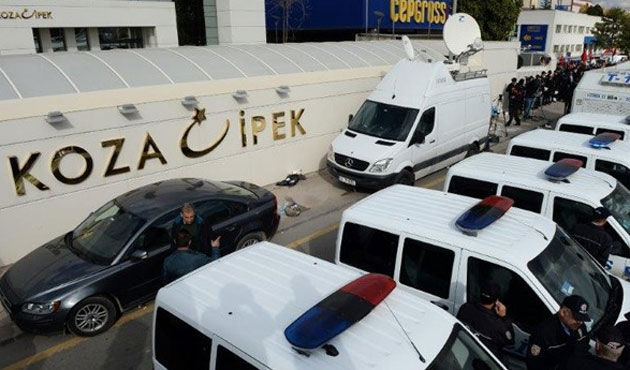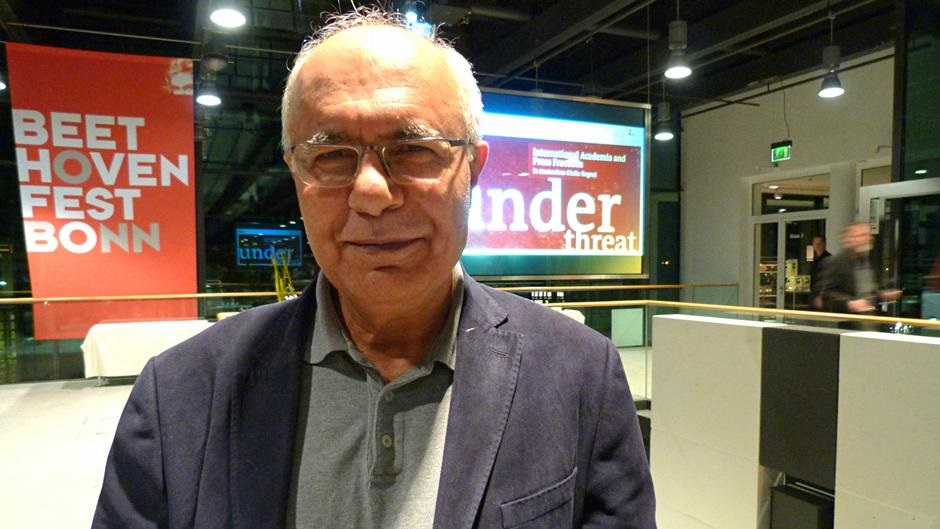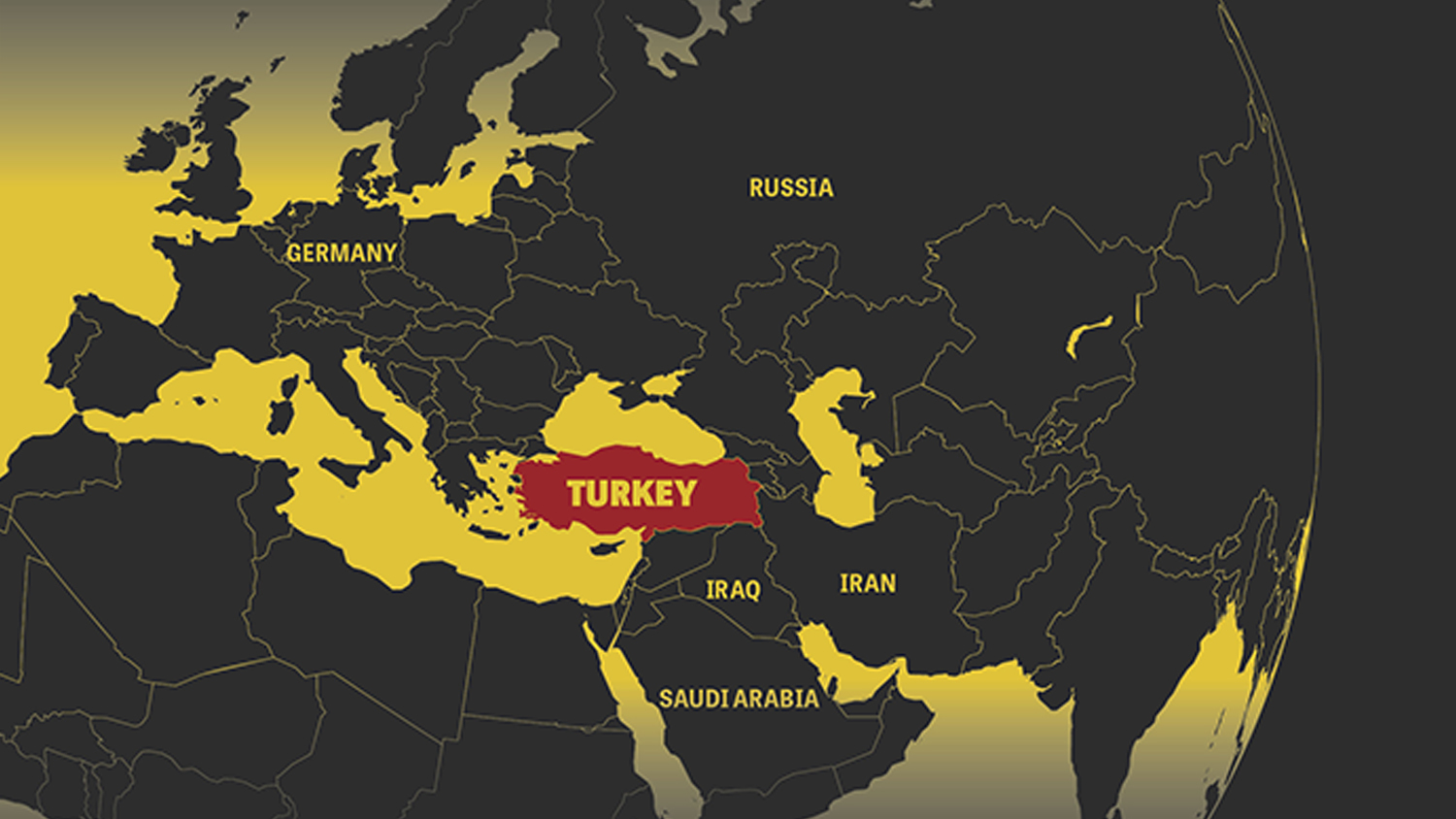By IHSAN GUMUS
He [Christ] said to them, “it is written, ‘my house shall be called a house of prayer’ but you make it a den of robbers.” (Matthew 21:13)
Despotic government
In Persian Letters, Montesquieu (1689-1755), by comparing East and West from the observations of fictional oriental travellers, describes “despotic government” as a government that is entirely in the hands of a single man who is the sovereign chief both in spiritual as well as in worldly affairs; the complete master of the life and goods of his subjects.[1]
Yet Montesquieu does not give special consideration to the situation of public/private goods against forfeiting capacity of such a government in the sense of property rights. That was likely because of less historical evidence in his days. Or possibly, he remained under the sway of “horror, darkness, and terror” distinctive features of despotic governments as represented by the oppressive monarchy of France at those times.
Whatsoever, if Montesquieu lived in today’s world he would likely see that the evidences come, not from the East only, but mostly from the post-colonial governments of twentieth century. He would easily identify the Duvaliers in Haiti, the Somozas in Nicaragua, Amin in Uganda, Bokossa in the Central African Republic, and Marcos in the Philippines as non-exhaustive examples of the well-known rulers who all deserve the epithet of kleptocrats. Nevertheless, with the overthrown of Mobutu of Zaire in 1997, as many of us, Montesquieu could also assume that such rulers’ reign ended anymore.
Contrary to what is assumed, happenings in Turkey subsequent to the case of “17/25” December scandals concerning widespread corruption at the top have made clear that despotic type of government never disappears. Further, we have seen that it may even maintain itself in an electoral democracy. Having crowded by general, presidential and local elections, and referenda each of which winner is always the same, Erdoğan, the last decade of Turkey provides a good evidence of this argument.
Today, Erdoğan is the President of the Republic, and at the same time, the head of the ruling party, AKP. Although, in all public speeches, he uses a language that could be considered uncivil, receives positive responses from majority of voters. That was almost the case in every voting season.
Thus, with reference to the present conditions of Turkey, we could fill in the page Montesquieu left blanked. This page suggests that, if an autocrat wishes to sleep in peace he should promote a war of extermination that continues to be waged between incumbent and dissents until the latter becomes extinct. Hence, “asset forfeiture programme” finds its real value within that notion.
Forfeiture in a nutshell
Authors are used to explain the term “forfeiture” with reference to the Biblical passage: “if an ox gores a man or a woman, that they die, the ox shall be surely stoned, and its flesh shall not be eaten.” Medieval notion of “deodand” which is derived from the Latin phrase “Deo Dandum” meaning “to be given to God” can also be seen as an archaic form of civil forfeiture. In both origins, forfeiture was initially confined to “guilty property”. However, it was later expanded to include all property and chattels belonging to criminals, serving, in principle, as a type of fine.[2]
In its ancient forms, asset forfeiture was mainly used by governments to fight piracy. Simply, if the government forfeits the ship used in piracy instead jailing the crew only, this prevents the criminal activity from continuing. More recently, forfeiture has emerged as a powerful tactical weapon in the fight against organized crime and drug trafficking.[3]
In brief, asset forfeiture involves government seizure of the personal assets obtained from, or used in, a crime. Otherwise, such should be called as robbery in “legal” means.
Forfeiture in Turkey: A brief history
Historical background of the concept leads us to suggest that, in modern Turkey, it was only the “Capital Tax” of 1942 putting the assets of certain taxpayers into an arbitrary assessment and ultimate forfeiture by the government.
Available evidence implies that the law on the capital tax was purposely designed in a way to lead the government to forfeit the wealth gathered in the hands of non-Muslim citizens. Or, alternatively they were forced to give up their properties with less worthwhile prices. Needless to say, huge majority of buyers were emerging Turkish merchants.
Implementation of the Law No. 4305 concerning the tax was thus based on the division of taxpayers into two main categories: M (Muslim) and G (Gayrımüslim: Non-Muslim). Later two more categories were added: E (Ecnebi) for foreigners and D (Dönme) for converts to Islam of Jewish origin.[4]
Seen from the government’s angle was that citizens in category G and D had made extraordinary profits during the World War II (WWII) turmoil and this should have been levied. To this end, the law required taxpayers to pay the allocated tax in cash within a fortnight. More strikingly, assessments were “final” and there was no administrative or judicial remedy to exhaust.
Against excessive tax burden beyond their paying capacity, many sold their properties for a song while forfeiture procedure applied for real estates. Those who failed to pay were deported to Aşkale, near to Erzurum province in eastern part of Turkey, where they would engage in road construction until their debts were fully paid.
Apart from this intervention of the one-party regime ruling under the WWII conditions, over the course of Turkey history, asset forfeiture largely remained, as it was generally the case in Western countries, limited to fight against organized crimes like smuggling, money laundering, drug trafficking, and so forth.
Forfeiture in reign of Erdoğan
Although asset forfeiture exists almost in all countries, Erdoğan’s asset forfeiture program is something cruel Turkish society had ever witnessed. That is the case both in terms of asset size and of numbers of citizens affected.
Indeed, this attack launched by the government was not a midnight operation facilitated by the coup attempt of last year only. That was a cumulative impact of power grabs that have been achieved by the ruling party, AKP in political arena. To understand how it works, let us bear in mind that AKP takes its roots from an Islamist movement: “National Outlook” (Milli Görüş).[5]
First and foremost, distinctive trait of this movement is that power is highly concentrated in the hands of one single individual. It is therefore not a surprise to see that Islamist movements are being represented in political divide by “hegemonic” parties. AKP is also a good sample of this kind in Turkey.
When they came to power, hegemonic parties require mass support to survive. To this, from the time he was new in the office, Erdoğan has employed main sources of the country as a gastro-politic instrument for creating a market for political loyalty and make citizens vest their interests in the survival of the existing government. This policy not only made his power more secure but also paved the way to the punishment of potential opponents with impunity.
In parallel to this, as it has become more capable of creating an image of invincibility that will discourage potential challengers, AKP devoted its power to change the constitution to erect autocratic electoral entities such as Constitutional Court, high courts, Council of Judges and Prosecutors, Grand National Assembly etc. Not only the mass support of voters in referendum of 16th April, 2017, but also the facts that;
- one of the opposition parties opted to survive as “satellite” organisation of AKP,
- other positioned itself as invariably better off playing the “loyal opposition”,
Played a key role in achievement of the constitutional changes toward one-man-rule in the form of “Presidency”.
Given the circumstances and the actors at play, we should not be surprised if less reaction was heard when the asset forfeiture programme started. And we should have known what would happen with the expansion of forfeiture powers.
Decree laws as a means of forfeiture
Since the coup attempt of 15th July 2016, asset forfeiture has become one of the greatest threats to property rights and due process in Turkey. Taking advantages of the state of emergency regime, the government introduced a large-scale forfeiture programme through decree laws. The target was economic capability of citizens who are seen linked with the Gülen Movement, alleged plotter of the coup.
Erdoğan’s forfeiture programme mainly works in two ways: (1) some asset, as it was the case in expropriation, is handed over directly to relevant public institutions by the new formal owner, Ministry of Finance, while (2) some managed by an appointed “trustee” (curator, kayyım in Turkish) at first hand and ultimately sold to private tenderers. Particular kind and functions of the assets are taken into consideration in this division.
Here is the point: in both categories, forfeiture serves to drawn resources from the economic to the political sphere where the “corporate titans” gather, holding resources for obtaining rents instead for producing goods and services.
Direct forfeiture: Just after the failed coup, Decree Law No. 667 was introduced on 22nd July, 2016. Within the article 2(1) of the decree;
- 2099 schools, dormitories, and universities in total,
- 1229 associations and foundations, and their economic facilities in total,
- 35 hospitals, and 19 syndicates,
Were shut down as they are considered linked with the “Gülen Movement” that was already labelled by the government as terrorist organisation.
Later, 146 media outlets in total were added into the above list by Decree Law No. 668 of 27th July and Decree Law No. 675 dated 29th October, 2016. However, in line with the article 20(3) of the Decree Law No. 674 some component of this latter group was handed over by the Ministry of Finance to the Savings Deposit Insurance Fund for sales. Huge amount of high-tech broadcasting equipment was effective in this transfer.
Decree laws concerned, within their standardised article 2(2), stipulate that all kind of assets belonging to those entities are transferred to the Treasury (National Estate) with no charge and real estates registered automatically on behalf of the Treasury. Transfer process is managed by the Ministry of Finance and, where relevant, General Directorate of Foundations.
In principle, such forfeiture requires the prosecutors to obtain a criminal conviction as the basis for forfeiting property. Simply stated, it is the taking of property derived from a crime, involved in a crime, or which makes a crime easier to commit or harder to detect. In direct forfeitures, however, being affiliated with the Gülen Movement is considered as a criminal activity involving the coup attempt despite lack of any causality between the coup and the forfeited assets. No prosecutor, no judge, to proceed in due process!
Decree laws also indicate that direct forfeiture is not limited to the above listed assets but influences into “liabilities”. For example, if you were a teacher who is working at one of those schools on the date of shutting down you would get neither any remaining salary nor damages. Further, if you were a parent who made an advance payment to the school to which your child was attending, you would never get this money back. When it comes to “receivables”, no exemption, you should pay it to the new owner of the school!
Subsequently, within the article 5 of the Decree Law No.670 dated 17.08.2016, government recognized such liabilities to be released upon submission of documentary proof unless the claimants are linked with Gülen Movement. However, we know that, for example, someone who preferred these schools is treated as follower of the movement concerned; less chance remains to recover it.
Indirect forfeiture by trustee: in commercial literature, trustee is known a person or entity that holds legal title to the trust property. It is rather seen as something relating to bankruptcy. Erdoğan regime, however, made the term trustee very popular in its “economic terrorism” against dissents through mass forfeiture and seizures.
Although it was introduced on 1st June 2005 within the article 133 of Turkish Code of Penal Procedure (TCPP), “appointing a trustee for the administration of a firm” as a preventive measure was revived by the Erdoğan regime. In principle, the article concerned, in case of strong suspicion of terrorist activity involved by any private company, allows to place it in government conservatorship through appointed trustees.
Available evidence indicates that the government implemented the huge part of the forfeiture programme through distortion of original purpose of trustee procedure within the TCPP. From their viewpoint, that was a necessity (!) to give forfeitures at least a veneer of legality. It is also true that recent forfeiture operations have seriously flawed the focus and priorities of law enforcement in Turkey.
Moreover, by 2015, “Penal Judges of Peace” (not courts, but individual judges embedded with the ruling party) with reference to article 133 of TCPP, began appointing trustees to the companies including media outlets based on the suspicion of linkage with Gülen Movement. Such a “suspicion” is even interpreted by these judges as a convincing proof of being member of a terrorist organization.
By the way, let us remember that, in a criminal proceeding, in the sense of “burden of proof”, the prosecutor must prove that someone is guilty beyond a reasonable doubt. But under TCPP, the court can take someone’s cash, car or home merely by showing that it is more likely than not that the property was connected to a crime. Contrary to this, you have to prove your innocence, if you are lucky enough.
In the case of Koza İpek, the elderly family members were not lucky enough: the trustee seized the family home because it belongs to the legal entity of the company and as a result, the family members were not allowed to enter into their own house, even though they were never charged with or convicted of any wrongdoing at that time.
General Trustee: Savings Deposit Insurance Fund
As the numbers of companies-with-trustee increase, for the sake of coordination of the forfeiture programme by one hand, government deemed to gather these companies under the overall ownership of the “Savings Deposit Insurance Fund” (SDIF), an institution irrelevant to the content.
By the article 19 of the Decree Law No.674 of 01.09.2016 (adopted by the Law No. 6758), SDIF was designated as a “General Trustee”, with a particular purpose of sales or liquidation, to head these companies that have been managed by individual trustees. This will also be the norm for all future trustee appointments during the state of emergency. Namely, in the context of the persecution of the Gülen Movement’s followers, SDIF remains sole responsible trustee to be appointed by the judges/courts throughout this period.
According to the quarterly report issued by SDIF, as of 31.03.2017, totally 879 companies or commercial enterprises from 43 provinces of Turkey were transferred to SDIF with the following financial summary:
- Total asset size: appr. 40,3 billion TL (appr. 11,5 billion USD),
- Total equity: appr. 18,1 billion TL,
- Total turnover: appr. 21,3 billion TL, and
- Total number of employees: 44.888
As of 11.08.2017, the companies in the portfolio of SDIF amount to 981 in total. We do expect these figures to go higher from day to day as the forfeiture programme still continues. Updated list could be seen from the following link of SDIF: http://www.tmsf.org.tr/sirket
When the sales and transfers are accomplished, historians may wish to record this case as the most sizable capital shift from corporate management to the agents of “Directly Unproductive Profit-seeking” (DUP) activities. But that is a topic for another article.
Decree Law No.675 of 29.10.2016, further expanded the trustee appointing procedure to the companies shared by the natural or legal persons affiliated with Gülen Movement with a rate less than fifty percent. According to article 9(1) of the Decree, “with the aim of management and representation of these shares”, SDIF shall be appointed by the court or judge as trustee in accordance with the article 133 of the TCPP.
As for the patents, trademarks and designs, on 21st of July, 2017 Minister of Science, Industry and Technology announced that, the legal rights over 734 trademarks, 72 designs (intellectual property), and 15 patents associated with Gülen Movement were handed over by Turkish Patent and Trademark Institution to SDIF. As well, 1687 trademarks and 29 designs were also transferred to the Treasury.[6] Nevertheless, it has remained uncertain how this transfer was achieved in lack of any authorization to do so.
Although it was originally in charge of “protecting the rights of depositors and to contribute confidence and stability of banking system” in Turkey, SDIF has thus become a kind of “CEO” of private companies ranging from simple restaurants to big holdings of the country like Boydak (furniture), Koza İpek (media, gold mining, energy), Dumankaya (housing, construction), Kaynak (publication, stationery) etc. Not only the legal framework, but also public institutions were distorted from their original purposes.
Of course, the patronage of SDIF is not intended as a permanent status. Forfeited assets should be transferred as soon as possible to the supporters of the ruling party. Article 81 of the Decree Law No.680, with the exception of the ones subjected to direct forfeiture, allows to release or liquidation of these companies based on the approval of the Minister to whom the SDIF affiliated.
The call for the companies or assets that are deemed ready for sales are published within the website of SDIF.[7] However, in the sense of transparency, crucial points give the alarm: the procedures governing the sales, award criteria, total income generated by the sales, identity of successful tenderers. Because of the strategic goals of the forfeiture programme as explained above, no award notice is also published.
Conclusion: transition from the house of prayers to den of robbers
Thus, as it is the case at the top of the state, through forfeiture of dissidents’ properties, supporters ultimately turn into noble robbers. Hereafter, they are expected to vest their interests in the survival of AKP in the office, even in case an electoral defeat occurred. It is not much important that mass forfeitures may create a regime of commercial uncertainty and confusion in the eye of foreign investors.
Here is the ultimate destination of a hegemonic Islamist party of which agents mostly have a religious background that aggrandises praying for forgiveness, afterlife preparedness, and altruistic behaviours. In fact, no surprise in their arrival to that point. At least for those who heard what Jesus Christ said to people of the Temple.
When we connected the dots, it would easily be seen that all the operations in the context of the asset forfeiture were parts of a much bigger programme in order to make the country safe for Erdoğan’s palace capitalism. In this DUP mode of economy, stealing is marginally more valuable than regular economic activity.
Sources:
- Montesquieu (2008)[1721]. Persian Letters (Trans. M. Mauldon), New York: Oxford UP. ↑
- Schwarcz, S.L. & Rothman, A.E. (1993). Civil Forfeiture: A Higher Form of Commercial Law? Fordham Law Review, Vol. 62, pp.287-320. ↑
- Dery, A.W. (2012). Overview of Asset Forfeiture. Retrieved from the following source:https://www.americanbar.org/publications/blt/2012/06/02_dery.html ↑
- For further details concerning Turkish Capital Tax in practice, see G. Angeletopoulos, The Turkish Capital Tax (Varlık Vergisi): An Evaluation. ↑
- For a brief history of relations between AKP and National Outlook, see Kursat Yılmaz (2017). Was Gulen Really ‘’Once a Close Ally’’ of Erdogan? ↑
- http://www.hurriyet.com.tr/bakan-acikladi-fetoye-ait-734-marka-72-tasarim-ve-15-patent-tmsfye-devredildi-40526923 ↑
- http://www.tmsf.org.tr/satis.ilani__________________________Links:
17/25 December corruption scandals
https://en.wikipedia.org/wiki/2013_corruption_scandal_in_Turkey
The Law No. 4305 on The Capital Tax (in Turkish)
http://www.resmigazete.gov.tr/arsiv/5255.pdf
The Turkish Capital Tax (Varlık Vergisi): An Evaluationhttps://ejournals.epublishing.ekt.gr/index.php/deltiokms/article/viewFile/2648/2413.pdfTurkish Code of Penal Procedurehttp://www.mevzuat.gov.tr/MevzuatMetin/1.5.5271.pdf Decree Law No. 667 (in Turkish)http://www.resmigazete.gov.tr/eskiler/2016/07/20160723-8.htm Decree Law No. 668 (in Turkish)http://www.resmigazete.gov.tr/eskiler/2016/07/20160727M2..htm Decree Law No. 670 (in Turkish)http://www.resmigazete.gov.tr/eskiler/2016/08/20160817-17.htm Decree Law No. 674 (in Turkish)http://www.resmigazete.gov.tr/eskiler/2016/09/20160901M2-2.pdf Decree Law No. 675 (in Turkish)http://www.resmigazete.gov.tr/eskiler/2016/10/20161029-4.htm Decree Law No. 680 (in Turkish)http://www.resmigazete.gov.tr/eskiler/2017/01/20170106M1-2.htm Quarterly report issued by the Bank Deposits Insurance Fund (in Turkish)http://www.tmsf.org.tr/Aspx/kk/ashx/file.ashx?type=1&uploadId=808 Secondary legislation on the management of the companies to which SDIF appointed as trustee (in Turkish)http://www.resmigazete.gov.tr/eskiler/2017/01/20170117.htm ↑
- [ANALYSIS] Rule-With-Violence: Emergence of the Erdoğanist Paramilitary in Turkey - 30/05/2018
- [OPINION] The Rise of “Predatory Government” in Turkey: An Insight into the Social Background - 09/02/2018
- [OPINION] Commonwealth of Erdoğan: Milking Public Enterprises Through Turkey Wealth Fund - 29/09/2017



